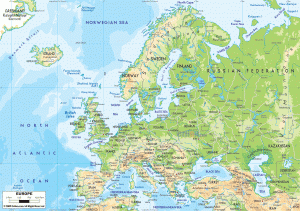
http://www.ezilon.com
Sebastian’s ultimate migration to Manhattan, New York from Buenos Aires, Argentina was not a direct journey. His migration journey took him to different parts of Israel for many years and to Northern California. His search for different experiences in different places perhaps stems from his own family history. His parents are migrants themselves. He told me the story of his mother and father’s journey to Argentina. Due to the extraordinary way he told the story to me, and the nature of the story itself, I have decided to keep everything in his own words.
I asked Sebastian, “How did your parents get to Argentina?”
He responded with, “This is a very long story.” He then launched into the story of his parents. He tells me,
They came to Argentina separately, and they met in Argentina. They came very young, and the decision of going to Argentina was my grandparent’s not my parents, my parents were children. On my mother’s side, my mother was born in Berlin, Germany. And her father was born in Berlin and her mother was Lithuanian. They, I don’t know how they met, but in Europe people just moved around a lot. So…my grandfather in 1933, when Hitler got power in Germany decided that it wasn’t a place to be in. He moved the family to Lithuania where my grandmother was from, so it was easy for them to settle there. He kept doing business with Germany so he would go back and forth from Lithuania to Germany while the family was settling in Lithuania. They lived in Lithuania for about 7 or 8 years. And my grandfather in one of his trips to Germany was caught in the beginning of the war when Germany started invading Poland. And he, being Jewish, decided that he needed to leave Germany as quickly as possible. [He] got on a boat that was going to London, and as the boat was departing the port in Germany he realized that if he got to London and all out war broke in Europe, he would not be able to come back to his family. He jumped off the boat and swam back. I mean the boat hadn’t gone far. So he swam back to the port and basically started walking across Europe from Germany to Lithuania. And it took him a long time. The family didn’t know where he was, had no news from him, until one day he appeared back in Lithuania. He then realized that Europe was going to be a holocaust for his family, so he started to look for ways of getting out of Europe for the whole family… My grandparents, and my mother, and my uncle’s family were one of the few families that were saved from Lithuania. They lived in a city called Kaunas, that was the provisional capital of Lithuania at the time, so there was a Japanese consul at the time called Sugi Hara who gave out visas to non-Lithuanians. So the irony is that the way they could get a visa, a temporary visa through Japan, was because my grandfather was German. They couldn’t give Visas to Lithuanians. So what had been a problem before – being German – now became rather helpful because he was able to get this visa for his whole family to leave Lithuania through Siberia and then by ship to Japan. And he saved his family that way. And he really did because fast forward many years after the war… they went back to Lithuania and to Germany to see if there were any survivors and there were none… [All] of the people who had [not] been directly saved by my grandfather really survived. Some of his family did go to Scandinavian countries, and they did survive. But the vast majority of that side of the family was killed by the Nazis… [My mother’s family] did live in Japan for a while and then they managed to get permanent visas to Argentina later on, within the year, I think. And they went to Argentina.
Hear audio: Maternal Grandfather
Then on my father’s side. My father was born in Prague, in Czechoslovakia. And my grandmother was from Prague, and my grandfather was from a part of Czechoslovakia called the Sudetenland, which was a German speaking part of Czechoslovakia. So his first language was German. Also the Sudetenland was the reason Germany invaded Czechoslovakia because they considered the Sudetenland part of Germany, or German territory, because it was mainly German. As the Germans were invading Czechoslovakia, my grandfather had arranged exit from Czechoslovakia to Argentina. So they managed to immigrate to Argentina in the nick of time. I think it was a question of days where they would not [have been] able to leave… They went directly to Argentina from Czechoslovakia. My grandfather knew one name of one person who gave him his first job in Argentina. And he started working in a textile company. He had a degree in Chemistry… [so he worked in] the coloring section of the textile… that was all done through chemical processes… having a degree in Chemistry helped him get that job. So that’s how they all got to Argentina. After the war they went back to Europe to see if there were any survivors, and there were none. In Lithuania there were no survivors… [except] some… on my mother’s father’s side of the family…left to Scandinavian countries and survived. On the Czech side of the family there were no survivors.
Hear audio: Survivors

